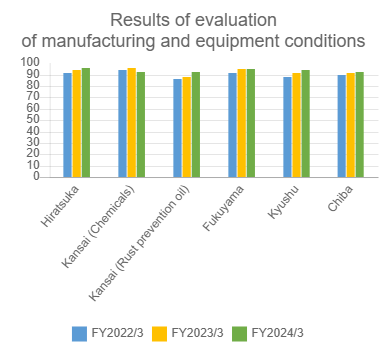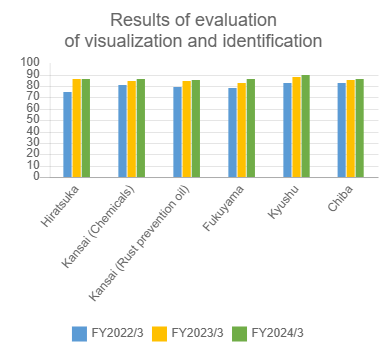ESG Information
Social Quality Assurance Initiatives
At the Nihon Parkerizing Group, we have established a Quality Policy under which the business segments and all departments engage in quality assurance activities to improve quality assurance.
Quality Policy
The Nihon Parkerizing Group strives to provide products and services that exceed the expectations of society and customers through quality improvement and technological innovation in its efforts to enhance customer satisfaction.
- We will provide reliable quality to our customers by continuously improving our quality management system.
- We will comply with legal and regulatory requirements and provide our customers with safe and reliable products and services.
- We will strive to earn the trust of our customers by thoroughly preventing the recurrence and occurrence of problems.
- We will enhance the transparency of our quality assurance system and conduct fair and sincere corporate activities.
Quality Assurance Organization
At Nihon Parkerizing, we have organized the Quality Assurance Division under the president's direct control to reinforce the company's quality assurance structure. Under its customer-focused policies, we are increasing initiatives to create a Group-wide quality assurance system through quality audit activities and quality training within the company and at domestic and overseas affiliates. We aim to provide products and services that exceed customers’ expectations and result in customer satisfaction.
Under the ISO 9001 fundamental principles of customer focus and improvement of customer satisfaction, we have clarified our procedures and implemented the PDCA cycle, thus advancing improvement initiatives on an ongoing basis.
In our overseas operations, we also work to obtain the ISO 9001 certification for all our overseas affiliates. We strive to build a structure that will enable us to meet global quality requirements.
Quality assurance structure
Quality management system
We have obtained certification under international quality standards (ISO 9001) for each chemical and toll processing business. The standard certification for quality management systems was obtained by the Kansai Plant in 1995 for the chemicals business and by the Hiratsuka No. 2 Plant in 1997 for the toll processing business.
Our chemical and toll processing plants are now certified to international quality standards. Under the ISO 9001 fundamental principles of customer focus and improvement of customer satisfaction, we have clarified our procedures for providing better products to our customers and implemented the PDCA cycle, thus advancing improvement initiatives on an ongoing basis.
As part of our commitment to improving quality, we have also acquired IATF 16949 certification for the automotive industry, JIS Q 9100 certification for the aerospace industry, and ISO 13485 certification for the medical device industry. Overseas, we are working to obtain ISO 9001 certification at all our affiliates. We are striving to build a system that will enable us to meet global quality requirements.
Rate of acquisition of ISO 9001 certification
Nihon Parkerizing
16 plants in total: 5 product manufacturing plants and 11 processing plants
Domestic consolidated subsidiaries
10 companies in total that are engaging in equipment manufacturing/ product manufacturing/ processing
* Acquisition status of ten of our 13 domestic consolidated subsidiaries (excluding Parker Giken Kogyo, Kyodoyuso, and Ozeki Chemical Industry, which do not engage in any of the above businesses) (Two of the ten companies have yet to obtain the certification.)
Overseas consolidated subsidiaries
17 companies in total, which are engaging in equipment manufacturing/product manufacturing/processing
* 17 major overseas consolidated subsidiaries
Dealing with Audits
At Nihon Parkerizing, we advance safety and quality standardization initiatives by effectively using internal quality audits to maintain and improve quality standards focused on the quality assurance structure. Through these activities, we strive to ensure quality at all of our plants, aiming to earn the trust of our customers. Example initiatives in the chemicals business are as follows.
Measures regarding internal quality audits
- Internal audits and the training of internal auditors
We conduct internal quality audits within the scope of the chemical business and toll processing business. We confirm QMS activities and correct and improve defects. The results of the audits are reported as a part of the management review. - Training of internal auditors
We enable our employees to obtain internal auditor qualifications through seminars from external organizations (such as JSA) and internal training sessions (hosted by the Quality Assurance Division). In FY2021, 38 people participated in an internal (remote) training session that we held to develop internal auditors.
Enhancing manufacturing quality control
We bolstered quality control with standardized process audits of our domestic manufacturing plants, affiliates, and subcontractors to advance sustainable resource management, production, and transportation. We plan to expand this initiative to our suppliers to strengthen our relationships with them.
Results of standardized process audits at manufacturing sites in FY2022
- Domestic manufacturing plants: 6 locations -- All are excellent plants*
- Plants of domestic affiliates: 3 locations -- Excellent or certified plants
- Plants of overseas affiliates: 9 locations -- Excellent or certified plants
- Domestic transportation contractors: 5 locations -- All are excellent transportation contractors.
* The judgment was made through audits that followed internal evaluation procedures and standards.
Standardization initiatives


Automatic transfer of product inspection result
We are working to prevent human intervention and avoid risks posed by humans by automatically incorporating quality inspection results into our manufacturing and sales systems. We have completed the introduction of this system at several of our plants. We will gradually expand this to other plants to promote further automation.
Our Quality Assurance Activities
Compliance and Quality Enhancement Month
To foster an awareness of compliance and quality, we have introduced a Compliance and Quality Enhancement Month to undertake various initiatives in December every year. We delivered the top message, “Handling numbers accurately and carefully”. We put up posters, including ones showing the quality slogan. In addition, each department determined the themes of their issues and worked on remedies and improvements. Ten Group companies also joined the activities.
| Implementation | |
|---|---|
| December | Implementation |
| January | Reporting results of initiatives |
Risk Management System (RMS)
What is a Risk Management System (RMS)?
We identify and evaluate (score) potential quality, safety, and environmental risks in our tasks based on standards.
For high-risk activities (behaviors), we take improvement and preventive measures to reduce the risk and then reevaluate the tasks.
Through these activities, we strive to improve sensitivity to risks, communication capabilities, insight, and ability to express ourselves, aiming to enhance onsite capabilities.
We introduced an RMS in 2012 to reinforce the structure of the manufacturing department and improve its onsite capabilities from the perspective of preventing product complaints and the recurrence of occupational accidents at our manufacturing plants in Japan.
At present, the toll-processing business segment has also established an RMS.
- Small-group activities
Employees working onsite engage in improvement activities in groups of several members each. The groups are organized based on sections, such as Manufacturing Section, Quality Control Section, Operation Section, Maintenance Section, and Logistics Group. They engage in activities lasting 30-60 minutes several times a month. These small group activities vitalize cross-sectional communications. - Reporting sessions at plants
Information about the achievements of the small-group activities is shared within each plant several times a year. Sound practices are horizontally expanded to other plants. - Nationwide reporting sessions
Once a year, we hold a nationwide reporting session to share example initiatives selected from the manufacturing and processing plants across Japan. We commended the excellent initiatives, honoring them with a President’s Award of Excellence and other awards.
We also plan to expand this initiative to Group companies in Japan, overseas affiliates, and others.

